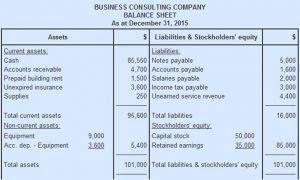
Proper financial management and bookkeeping are fundamental to running an efficient and successful medical practice. Yet with the challenges of delivering excellent clinical care, finances are often neglected. This inevitably leads to lost revenue, tax penalties, disrupted operations, and preventable business failures.

What is the typical range of pricing for medical accounting software?
Some of these expenditures could be operating expenses, which would go on the income statement, while others could be capital expenses that are reported on the balance sheet. So, while it may look like the practice accounting for medical practices generated some net income, that doesn’t necessary mean that you will see that profit in the bank account. Another item that most people forget to consider in healthcare accounting is the repayments of loans.
- This system is designed to link strategy and performance indicators, by choosing those performance indicators that are instrumental for achieving strategic goals.
- Instead of looking at the company’s financial statements, a tax accountant focuses on the company’s taxes.
- Efficiently managing the cash flow from accounts receivable is a balancing act.
- Once you have an administrative staff in place, it’s a good idea to invest in their financial education as well.
- According to the Medical Group Management Association (MGMA), implementing these solutions can significantly reduce billing errors, improve revenue cycle management, and enhance overall financial performance.
Leverage Cloud-Based Software
And so we find a cost system that produces three separate cost-per-minute rates that can be traced to patients in the three different specialities. This is an indirect cost in the sense that it is a cost whose behaviour we do not easily understand at the patient level and so we are challenged when it comes to choosing an appropriate cost driver. Such department-based aggregations are often a matter of practical convenience.
- Accountants can help you gather and analyze this data, which is why accounting currently has a market size of nearly $600 billion[1] and continues to grow.
- Fiduciary accounting is a type of accounting that deals with the financial transactions of an estate or a trust.
- Pay for performance is also the health care industry’s least standardized payment model, something that could saddle health care accountants with an additional challenge.
- It centralizes billing operations and integrates them seamlessly with electronic health records and practice management systems, which is why it is excellent for specialty medical practices.
5.5. Performance management

I believe it’s best for specialty medical practices because it understands and caters to the distinct requirements of such operations, enabling these practices to improve financial management efficiency. Building on these kinds of analyses, activity-based costing data can go on to inform more appropriate budgetary processes as part of the ongoing management of providers. When there are no costing data at the patient level, the danger is that budgets are set based on past arrangements, power and interests rather than clinical needs, practices and outcomes. Activity-based costs at the patient level allow for more accurate estimates of costs at the service line-level based on the number and type of patients expected. The budget process becomes more objective and fair-based on clearly specified modelling of resource consumption and less on power and local interests. Importantly, the process of developing the quality of cost information can prompt clinical deliberations and decisions over what represents cost-effective health care.

For those new to it, health care accounting can feel about as confusing and daunting as conducting an open heart surgery. Health care businesses and medical practices might struggle to keep up with the constant changes in regulations, rules, and laws that govern the industry. The cash basis is easier to implement, but it generates financial statements that poorly represent a medical practice’s profitability. Doctors often provide services and go without the corresponding revenues for months, if they ever receive them at all. The sheer complexity of medical practice accounting makes software essential for healthcare providers. It’s prohibitively difficult and time-consuming to keep track of everything by hand.
The perceived inaccuracy of volume-based overheads allocation at clinical unit levels can even lead clinicians to reject the tariff. Ultimately, volume-based costing is most problematic because it limits the potential for cost data to meaningfully inform clinical and managerial decision-making. Countries with DRG-based financing systems use costing data from providers to inform tariff setting, comparisons across providers and efficiency and performance assessment at the system level. In contrast to many other industries, detailed product or service costing is regulated, collected by government and sometimes publicly reported.
Your Healthcare CPA
Partnering with bookkeeping specialists like Uplinq can further optimize your systems and provide the ongoing strategic guidance that prosperous practices rely on. With diligent bookkeeping and financial mastery, your medical business will have the foundation needed to flourish. Bookkeeping relies on the double-entry accounting method, which requires recording every transaction in at least two accounts. For instance, recording a bill payment would require debiting the expense account and crediting the cash account. Embrace the fact that you’re going to need help managing your medical practice accounting responsibilities, and don’t be afraid to pay for assistance.
Clinicians engage with costing information through a range of common management accounting practices. The two most basic financial statements are the balance sheet and income statement. In medical practice accounting, most practices use the cash-basis method of accounting. Under the cash-basis method of accounting, revenue is not recognized until it is received, and expenses are not recognized until they are paid. WRS Health provides robust practice management and medical billing software specifically designed for medical specialties.
- Patient care can be your main priority, but your medical practice is also a business.
- With cash basis accounting, revenue is recognized when you receive payments, and expenses are recorded when you pay them.
- As a result, the treatment of property costs across organizations can be irregular.
- By virtue of aggregating so many different kinds of costs into a single figure, there is no single cost driver that offers a clear reflection of what accounts for costs in the finance department.
- Cost reduction targets are often initially formulated at national or political levels.
- I determined that CareCloud is best for the integrated patient experience because of its well-designed interfaces and features that cater to patient communication and engagement, apart from handling the financial aspect.
Reports and Financial Statements
You adopt this approach by recording expenses as soon as they are paid and receivables as soon as money is received. Health care accountants also have extensive knowledge of billing processes and reimbursement rates that can be beneficial when negotiating contracts with insurers or other third-party payers. You may still need to acquire a few tools for whatever your PMS can’t help you with, such as accounting and payroll services. Before committing to any products, make sure you’ve chosen ones that can interface with each other seamlessly. Here are some best practices you can implement to optimize your accounting function and minimize the time you have to spend managing it. The many years you spent in medical school were highly effective at preparing you to assist your patients.
Choosing Bookkeeping Software and Tools
What Sort of Accounting Information Does a Doctor Use in His Business? – Chron
What Sort of Accounting Information Does a Doctor Use in His Business?.
Posted: Wed, 13 Jul 2016 15:52:23 GMT [source]
Pricing for Xero starts at $11/user/month, making it an affordable solution for businesses of all sizes. This is because your company’s industry, years in business and unemployment history can all determine the percentage used to calculate the amount due. However, providers like hospitals often end up with numerous outstanding checks due to recipients who have died or moved. In some states, funds from such uncollected checks must be turned over to the state government because of unclaimed property laws.
